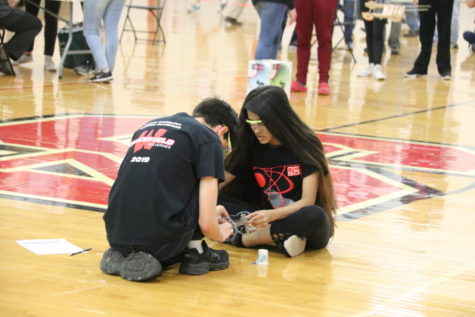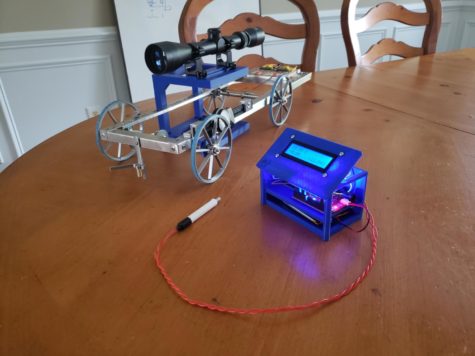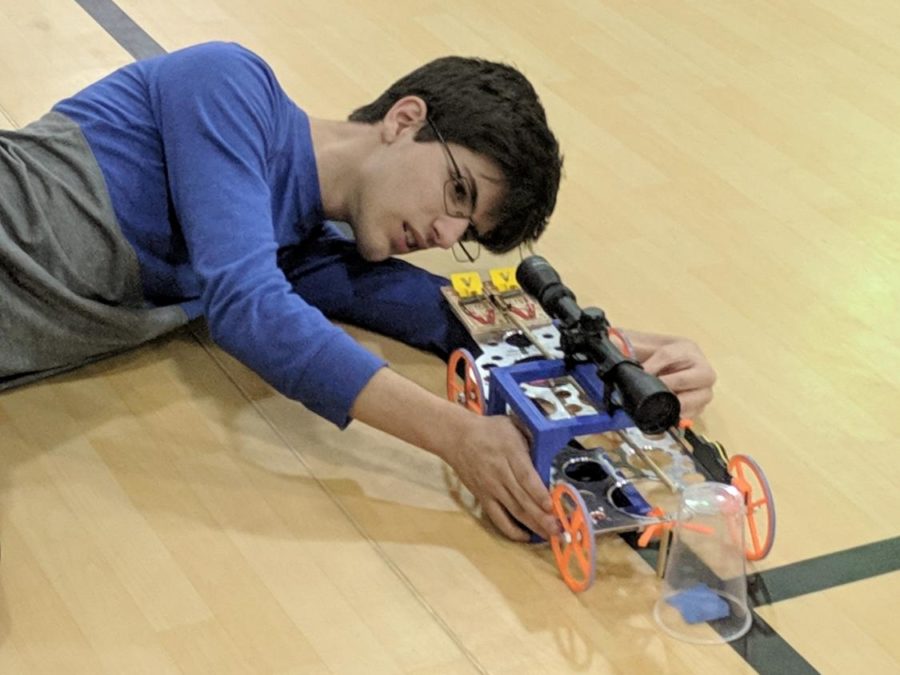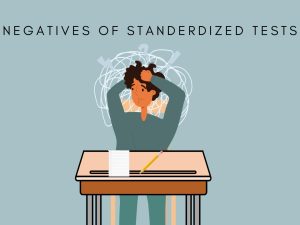Mousetrap vehicle accelerates past the competition: Science Olympiad states tournament
Photo Courtesy to Rosemary Ros
Sophomore, Michael Pearce-ros practices using the sight.
May 22, 2019
Wakefield was proudly represented on Saturday, April 27, at the state-level Science Olympiad competition for Mousetrap Vehicle and Designer Genes events — ultimately bringing home a gold medal for the first time in the team’s history.
As First Place Overall Winners (FPOWs) in their events, Caitlin Raftery, Skye Ashforth, Kirren Shaikh and Michael Pearce-Ros moved from the initial regional competition, which took place in February, onto states — held this year at North Carolina State University. Pearce-Ros and Shaikh won tenth place in Mousetrap Vehicle out of over 40 schools’ teams and the additional FPOWs. To top it all off, Pearce-Ros received a gold medal in one trial event that took place a day before the main competition.
“It was the first time since 2003 that anyone from [Wakefield] had made it as an FPOW,” Rosemary Ros said, a long time event coach and proponent for Science Olympiad. “Having Michael win the gold medal in the trial event, and then win the tenth place medal with Kirren in Mousetrap Vehicle… was icing on the cake.”

Sophomore, Michael Perce-ros and Junior Kirren Shaikh set up for a state run.
Our whole Science Olympiad team has yet to qualify for states. This season, those that competed were invited only for their first place events from regionals. One hurdle in the race to states is the competitiveness of the Raleigh regional tournament — NCSSM, Raleigh Charter and Enloe are all vying for the top medals. Oftentimes, these schools enter the regional competition as ‘National Ready’ teams or receive guaranteed promotion to states. From regionals, however, the competition only gets fiercer.
“[The state-level tournament] is very cutthroat,” Ros said. “Students aren’t only competing against the highest placed schools of all the regional tournaments and their FPOWs, but directly competing against the schools who [qualified for] the ‘National Ready’ regional tournament in Raleigh.”
Powered only by the tension of two mousetraps, Pearce-Ros and Shaikh had to design a vehicle that would travel forward eight meters, stop, then move backwards. During regionals, the device was supposed to reverse for one to two meters, while, for states, the range was two to four. Just before the teams’ demonstrations, they were informed of the exact distance. In order to meet the more demanding design parameters of the state competition, the pair upgraded their original model.
“[Before regionals], we used a 3D printer to print out some of the parts that we couldn’t order,” Shaikh said, a junior who has competed in Science Olympiad for two years now. “[For states], we changed the bottom of it, so it would be lighter. The brake system was also fixed.”
These changes, however, required an extensive amount of time — both to test and make further adjustments. Along with the many hours spent over spring break conducting test runs, simply finding a suitable surface challenged our competitors.
Pearce-Ros, currently a sophomore, is no stranger to these tribulations. His participation in Science Olympiad stretches back to middle school, winning second place in Hovercraft as an FPOW during states one season.
“We were much more rigorous with our testing [to prepare for states] — also the thing was completely rebuilt,” Pearce-Ros said. “During spring break, I went out everyday to test the mousetrap vehicle. This version was of a lighter caliber, more thin. It was much faster.”
As another triumph that weekend, Pearce-Ros earned a gold medal in Detector Builder — a trial event in which competitors build a computerized temperature sensor. A reference device was given to students for them to calibrate their own sensors, trying to match it to the compared device as accurately as possible.
“The design challenge was, without using a pre-constructed thermometer, we had to make a thermometer that would be exposed to various temperatures in the water from freezing to boiling,” Pearce-Ros said. “We had to make it by hand and it had to have its own microcontroller.”
This past season was one of Wakefield’s strongest, and returning members are hopeful for next year. Science Olympiad coordinator Laura Stiles attributes our recent successes to students coming in with greater experience.

Mousetrap vehicle with the sight.
“[The middle school team] made it to the state competition last year as a team. They are consistently strong,” Stiles said. “So I have all these freshmen that come in who are really interested in doing it; when we were split campuses the ninth graders didn’t have much of an opportunity to be involved.”
As the team works its way up the totem pole, students’ ambitions for future seasons climb with them. With enough effort, there’s no telling what our Science Olympians will achieve next.
“Next year, the national level is going to be in Raleigh — we [first need to] get our entire team to go to the state level,” Pearce-Ros said. “I feel like we can do it. This has been our best year yet.”









